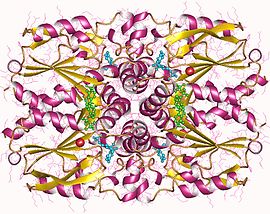
Summary
In enzymology, an uridine kinase (EC 2.7.1.48) is an enzyme that catalyzes the chemical reaction
| uridine kinase | |||||||||
|---|---|---|---|---|---|---|---|---|---|
 Uridine-cytidine kinase 2, tetramer, Human | |||||||||
| Identifiers | |||||||||
| EC no. | 2.7.1.48 | ||||||||
| CAS no. | 9026-39-5 | ||||||||
| Databases | |||||||||
| IntEnz | IntEnz view | ||||||||
| BRENDA | BRENDA entry | ||||||||
| ExPASy | NiceZyme view | ||||||||
| KEGG | KEGG entry | ||||||||
| MetaCyc | metabolic pathway | ||||||||
| PRIAM | profile | ||||||||
| PDB structures | RCSB PDB PDBe PDBsum | ||||||||
| Gene Ontology | AmiGO / QuickGO | ||||||||
| |||||||||
- ATP + uridine ADP + UMP
Thus, the two substrates of this enzyme are ATP and uridine, whereas its two products are ADP and UMP.
This enzyme belongs to the family of transferases, specifically those transferring phosphorus-containing groups (phosphotransferases) with an alcohol group as acceptor. The systematic name of this enzyme class is ATP:uridine 5'-phosphotransferase. Other names in common use include pyrimidine ribonucleoside kinase, uridine-cytidine kinase, uridine kinase (phosphorylating), and uridine phosphokinase. This enzyme participates in pyrimidine metabolism.
Structural studies edit
As of late 2007, 8 structures have been solved for this class of enzymes, with PDB accession codes 1UDW, 1UEI, 1UEJ, 1UFQ, 1UJ2, 1XRJ, 2JEO, and 2UVQ.
References edit
- Orengo A (April 1969). "Regulation of enzymic activity by metabolites. I. Uridine-cytidine kinase of Novikoff ascites rat tumor". The Journal of Biological Chemistry. 244 (8): 2204–9. PMID 5782006.
- Skold O (1960). "Uridine kinase from Erlich ascites tumor: purification and properties". J. Biol. Chem. 235: 3273–3279.



